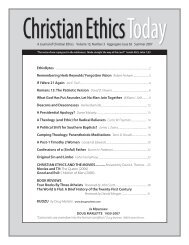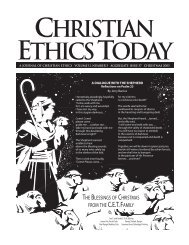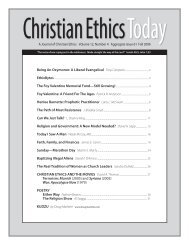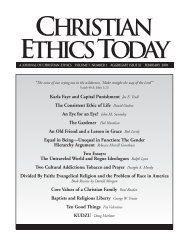Issue 033 PDF Version - Christian Ethics Today
Issue 033 PDF Version - Christian Ethics Today
Issue 033 PDF Version - Christian Ethics Today
Create successful ePaper yourself
Turn your PDF publications into a flip-book with our unique Google optimized e-Paper software.
life. In so many ways, don’t we really still live apart? We may<br />
attend school together, work together, and play together.<br />
Sadly, however, we are not so much doing these things together<br />
as we are simply in the same place doing them separately, but<br />
in each other’s presence. 6<br />
Here’s a valid reason to begin relating across those barriers<br />
that separate us: we do it because it’s right—because it’s the<br />
law. We MUST guarantee that everyone at Hardin-Simmons<br />
has equal opportunities for success and happiness, because our<br />
nation was founded on the belief that this equality is a basic<br />
human right. Yet, there’s a higher motivation for welcoming<br />
multiculturalism.<br />
That is the fourth reason—namely, we look out for others<br />
because to do so is good! This is the moral answer.<br />
Morality demands more of us than legality. Why do we try to<br />
get along with others? Well, we relate to each other with tolerance<br />
because that’s the way we should act.<br />
Moral philosophers have long taught this kind of regard<br />
for others. Plato considered the crowning human virtue to be<br />
justice, understood as “the virtue of harmonious action [that]<br />
forges a link between the individual and the social dimensions<br />
of life.” Justice, thus, “is not merely a personal virtue but is<br />
preeminently a social one” 7 that determines how one treats<br />
others. The German thinker Immanuel Kant argued centuries<br />
later that people should act in such a way that they could be<br />
satisfied were their action to become a universal behavioral<br />
norm. 8 But these European ideas were preceded in time by<br />
similar wisdom from Asia. For example, Confucius taught his<br />
followers to cultivate loyalty, humanity, integrity, mutual<br />
respect, personal self-restraint, and harmonious family and<br />
social relationships. 9 Likewise Shantideva, an ancient Buddhist<br />
philosopher, taught the importance of a proper attitude<br />
toward one’s enemy. “If you can cultivate the right attitude,”<br />
he said, “your enemies are your best spiritual teachers because<br />
their presence provides you with the opportunity to enhance<br />
and develop tolerance, patience, and understanding.” 10<br />
We tolerate those who are different from ourselves because<br />
sages and saints of world history have believed that this kind of<br />
mutual acceptance is the just way to act. At Hardin-Simmons,<br />
we MUST treat everyone fairly, for such actions will distinguish<br />
our campus as a place where all can feel at home and<br />
26 • APRIL 2001 • CHRISTIAN ETHICS TODAY<br />
where none is excluded. To do less would be to behave unjustly<br />
and immorally.<br />
But there is a higher reason still for embracing multiculturalism<br />
on our campus: we reach out to others because it is<br />
compassionate. This is the <strong>Christian</strong> answer. Tolerance is the<br />
secular answer, the philosophical norm. But love is Jesus’ way.<br />
And love is more demanding than tolerance. Jesus crossed all<br />
kinds of barriers that separated the respectable religious folk of<br />
his day from the “riff raff” of Palestinian society. He gathered<br />
his disciples from among simple and uneducated Galileans.<br />
He related positively to women, ministered to them in ways<br />
that were daring, and praised their examples of godly living.<br />
He touched the diseased bodies of the infirm to restore both<br />
their health and place within the community. He took the side<br />
of the poor and the dispossessed. He did battle with spiritual,<br />
demonic powers to rescue the helpless and hopeless. He celebrated<br />
the innocence of little children. He reached out to<br />
social outcasts, Samaritans, and Gentiles. Little wonder that<br />
Paul, one who felt accepted by Christ and miraculously called<br />
to be his missionary, penned a tribute to Jesus’ risky, inclusive<br />
love. Paul wrote: “There is no longer Jew or Greek, there is no<br />
longer slave or free, there is no longer male and female; for all<br />
. . . are one in Christ Jesus” (Gal. 3:28). Because of Jesus’<br />
embrace of diverse peoples, in other words, <strong>Christian</strong>s should<br />
not practice racial, socioeconomic, or gender discrimination,<br />
for all are one in Christ. We can only speculate what other barriers,<br />
knocked down by Jesus’ compassion, Paul would articulate<br />
were he to write this reminder to believers in today’s<br />
divisive world!<br />
We MUST love others here because that’s the godly thing<br />
to do, for God is love. That doesn’t mean that we will<br />
necessarily appreciate someone’s behavior or choices, even as<br />
we love them. It certainly doesn’t mean that we have to condone<br />
their actions before we can accept them. That would be<br />
conditional love, yet we know that God’s kind of love—the<br />
agape we are commanded to practice toward others (John<br />
13:34-35)—is unconditional. Frankly, if Jesus walked the<br />
streets and hallways of our campus today, he would meet<br />
everywhere people who differ from him—people whose<br />
behavior and choices sadden him. How might he respond?












